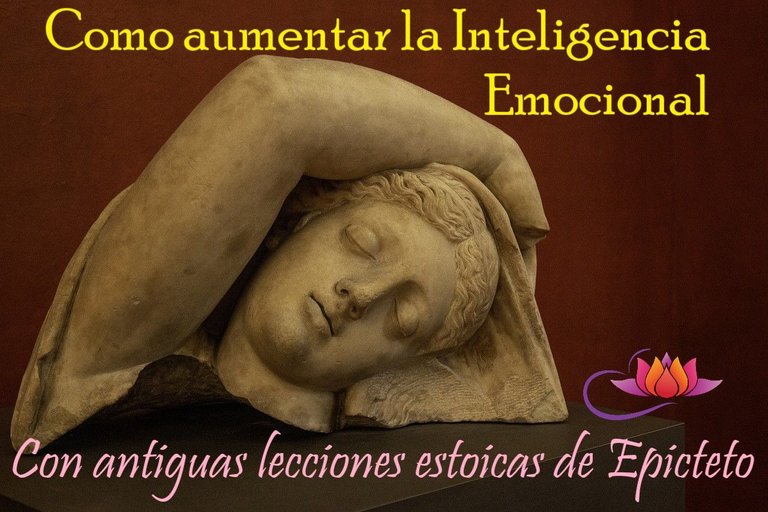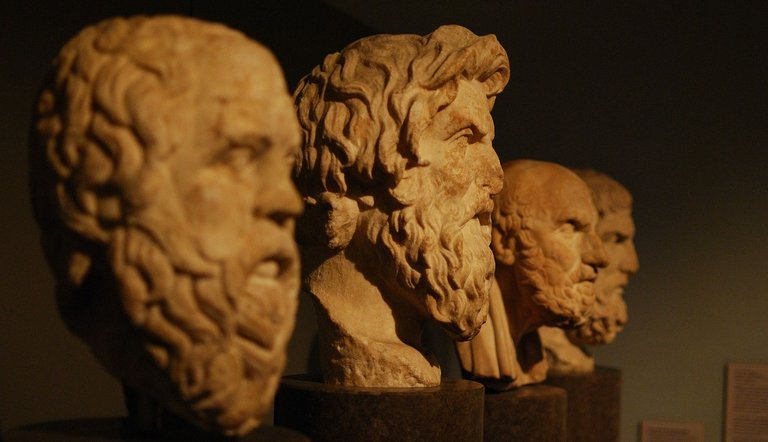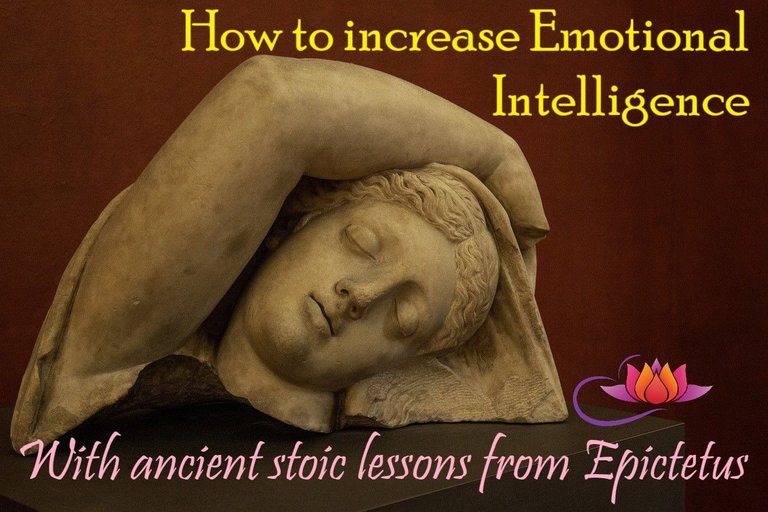

Mejorar nuestra inteligencia emocional, elevarla, es una de las razones por las que hacemos contenido creativo e inteligente en @Holos-Lotus
Las personas con una mayor inteligencia emocional tienen esa gran habilidad para reconocer las emociones propias y las de los otros, lo que implica que actúen en forma tranquila, equilibrada y muy asertivamente.
El pensamiento que ofrece El Estoicismo, donde uno de sus principales exponentes fue Epicteto, nos regala una serie de lecciones que aumentan notablemente esta capacidad de tener una mayor inteligencia emocional.
Algo necesario comenzando la mejor época del año: La Navidad.


Todos buscamos la inteligencia emocional
Un ser humano que entiende que, lo que hay sobre la Tierra, existe por una determinada razón, y trata de entenderlo y de respetarlo, al menos en el aspecto humano.
Que tiene una manera de hablar que no se centra en sí mismo, pero que busca asumir la responsabilidad de sus actos; es una persona con alto nivel de inteligencia emocional.
Aquel que recuerda los detalles de las personas con las que interacciona, porque escucha; que forma parte de los que entienden o respetan las opiniones de los otros y que siempre redirige el foco de atención a todos, para que el protagonismo sea colectivo; es una persona con alta inteligencia emocional.
Si lográramos entender que el respeto a lo que existe, a los seres humanos, a las diferencias, a las opiniones, creencias y valores; pudiésemos estar en el mundo, aportando y, no juzgando, construyendo y, no destruyendo lo que, según nosotros creemos, no es lo correcto.
Eso sería un mundo inclusivo.
Y existen muchos pensamientos antiguos y filosofías de vida que es bueno rescatar y de vez en cuando, colocar sobre estas páginas para que podamos mejorar nuestra interrelación social y, por supuesto, tener una mejor calidad de vida.

El estoicismo
Se le atribuye a Zenón de Citio, en el 300 antes de Cristo, de Chipre, el que nos diera una filosofía para explicar un camino o dirección de vida para el ser humano.
Las principales ideas de esta filosofía son, que la meta final de la vida es alcanzar la felicidad, que es el florecimiento personal o la autorrealización.
Igual, el actuar con virtud como condición indispensable para alcanzar esa felicidad; y dentro de las virtudes que se luchan, está la tranquilidad, la serenidad mental.
Entender que el control de los impulsos o las emociones, aceptando las situaciones o eventos de la vida, conlleva enfrentarlas y a trabajar en pro de esa felicidad.
Todo lo cual conduce a una increíble elevación de la inteligencia emocional en el individuo.

Algunas reflexiones de Epicteto
De los conocidos representantes de esta filosofía de vida, está Epicteto (55-135 dC), quien fue un filósofo griego que nació esclavo en Hierápolis, que vivió en Roma hasta su destierro a Nicópolis, en Grecia; y cuyas enseñanzas fueron escritas y publicadas por su alumno Arrian.
Y dejó increíbles enseñanzas estoicas importantes:
1.- No todo depende de nosotros
La impotencia y la frustración nacen de no poder cambiar las circunstancias.
Es cierto que no podemos cambiarlas, pero sí podemos elegir cómo reaccionar ante estas; aceptarlo y mirar de frente, un hecho que descargará mucho sufrimiento.
2.- Es importante que te hables bien a ti mismo
El diálogo interno negativo es muy dañino, porque la forma en la que nos hablamos termina teniendo una gran influencia en nuestras emociones.
El bienestar psicológico siempre es perjudicado por las voces negativas hacia nosotros mismos.
Así, entender cómo actuamos y el porqué, es importante para explicarnos la razón de nuestras acciones y alejar la culpa; pero también, el trabajar nuestros pensamientos para desvincularnos de todo aquello que pensamos que nos quita valor y poder.
3.- Las opiniones y los problemas de los demás son contagiosos
Y esto habla de publicaciones que he realizado en la comunidad, donde es importante entender, cuáles personas tóxicas tenemos a nuestro alrededor.
Las opiniones negativas pueden hacernos perder la perspectiva de la realidad y crear concepciones que no están acordes con el bienestar emocional.
Por otro lado, aunque no podemos escoger a quienes tenemos en nuestro entorno, como sucede a nivel laboral; sí podemos observar las actitudes, e incluso, los pensamientos de la gente que nos rodea, para evitar aquello que es negativo y dañino.

El estoicismo sigue presente en la actualidad
Aunque vemos que son cientos de años de historia lo que tiene esta filosofía, el estoicismo sigue presente; porque en tiempos complicados, soportar las dificultades y crear resiliencia, es parte de la enseñanza que este estilo de vida nos deja.
En medio de tantas dificultades, de toda naturaleza, que el ser humano moderno vive, el sufrimiento es parte del día a día.
Y el control emocional no se realiza ocultando lo que sentimos ni frenando esas sensaciones; se trata de ponernos al frente la realidad, lo que ocurre, y entenderla o estudiarla, de tal manera, que podamos trabajar con base a cada una de estas situaciones.
Hoy en día observamos que mucha gente se aferra al sufrimiento y al dolor como una manera de llamar la atención y de ser atendido, lo que genera inseguridad e indefensión.
Pero todos los seres humanos tenemos la posibilidad de atravesar eventos difíciles que deberían llevar un aprendizaje que nos lleve a cambios y a mejorar el conocimiento de lo que es la vida, de lo que somos y de las herramientas con las que contamos para disfrutarla y llegar a sentir la tan añorada paz interior.


In December, elevate your emotional intelligence with 3 lessons from Epictetus -Stoicism as a guide-


Improving our emotional intelligence, raising it, is one of the reasons why we make creative and intelligent content at @Holos-Lotus.
People with higher emotional intelligence have that great ability to recognize their own emotions and those of others, which implies that they act in a calm, balanced and very assertive way.
The thought offered by Stoicism, where one of its main exponents was Epictetus, gives us a series of lessons that significantly increase this ability to have a greater emotional intelligence.
Something necessary at the beginning of the best time of the year: Christmas.


We all seek emotional intelligence
A human being who understands that what is on Earth exists for a certain reason, and tries to understand and respect it, at least in the human aspect.
Who has a way of speaking that does not focus on himself, but seeks to take responsibility for his actions; is a person with a high level of emotional intelligence.
He who remembers the details of the people with whom he interacts, because he listens; who is part of those who understand or respect the opinions of others and who always redirects the focus of attention to all, so that the protagonism is collective; is a person with high emotional intelligence.
If we could understand that respect for what exists, for human beings, for differences, for opinions, beliefs and values; we could be in the world, contributing and not judging, building and not destroying what we believe is not the right thing to do.
That would be an inclusive world.
And there are many ancient thoughts and philosophies of life that it is good to rescue and from time to time, place on these pages so that we can improve our social interaction and, of course, have a better quality of life.

Stoicism
It is attributed to Zeno of Citium, in 300 B.C., from Cyprus, to give us a philosophy to explain a path or direction of life for the human being.
The main ideas of this philosophy are that the ultimate goal of life is to achieve happiness, which is personal flourishing or self-realization.
Likewise, to act with virtue as an indispensable condition to reach that happiness; and within the virtues that are fought for, there is tranquility, mental serenity.
To understand that the control of impulses or emotions, accepting the situations or events of life, leads to face them and to work towards that happiness.
All of which leads to an incredible elevation of emotional intelligence in the individual.

Some reflections of Epictetus
Of the well-known representatives of this philosophy of life, there is Epictetus (55-135 AD), who was a Greek philosopher who was born a slave in Hierapolis, who lived in Rome until his exile to Nicopolis, in Greece; and whose teachings were written and published by his pupil Arrian.
And he left incredible important stoic teachings.
1.- Not everything depends on us
Impotence and frustration are born of not being able to change circumstances.
It is true that we cannot change them, but we can choose how to react to them; accept it and look straight ahead, a fact that will unload a lot of suffering.
2.- It is important that you speak well to yourself
Negative internal dialogue is very harmful, because the way we talk to ourselves ends up having a great influence on our emotions.
Psychological well-being is always harmed by negative voices towards ourselves.
Thus, understanding how we act and why is important to explain the reason for our actions and remove the guilt; but also, working on our thoughts to disassociate ourselves from everything that we think takes away our value and power.
3.- The opinions and problems of others are contagious
And this speaks of publications that I have made in the community, where it is important to understand which toxic people we have around us.
Negative opinions can make us lose perspective of reality and create conceptions that are not in line with emotional well-being.
On the other hand, although we cannot choose who we have in our environment, as happens at work, we can observe the attitudes and even the thoughts of the people around us, to avoid what is negative and harmful.

Stoicism is still present today
Although we see that this philosophy has hundreds of years of history, stoicism is still present; because in complicated times, to endure the difficulties and create resilience, is part of the teaching that this lifestyle leaves us.
In the midst of so many difficulties, of all nature, that the modern human being lives, suffering is part of everyday life.
And emotional control is not achieved by hiding what we feel or by restraining those feelings; it is about facing reality, what is happening, and understanding or studying it, so that we can work on the basis of each of these situations.
Nowadays we observe that many people cling to suffering and pain as a way of attracting attention and being attended to, which generates insecurity and helplessness.
But all human beings have the possibility of going through difficult events that should lead us to learn how to change and improve our knowledge of what life is, of what we are and of the tools we have to enjoy it and feel the longed-for inner peace.

Emilio Ríos – Venezuela
@emiliorios


- Barras separadoras y logo de English, editadas en Paint, de:
Separator bars and English logo edited in Paint, from:
Pixabay-PixelAnarchy
Custom @emiliorios headband with the #Hive logo, made by the excellent creator @mosa71Cintillo personalizado de @emiliorios con el logo de #Hive, realizado por la excelente creadora @mosa71Nuevo logo de Twitter tomado de la plataforma de la red social.
New Twitter logo taken from the social network platform.Imagen de agradecimiento, tomando el logo de nuestra comunidad y editado en Paint, de:
Thank you image, taking our community logo and edited in Paint, by:
Pixabay-Pezibear
- Logo de la comunidad utilizado en las imágenes, de:
Community logo used in the images, from:
Pixabay-2405360
- Si lo deseas, puedes seguirnos en:
If you wish, you can follow us at:




@ emiliorios, It was nice to read your post. Really negative self-talk can spoil our personalities. And life can be directionless. very Nice. Thank you very much.
Gracias por visitarme @mulik369 y por el comentario tan correcto.
Amigo, que buena reflexión la que nos traes acerca del estoicismo! Me parece que abordas un tema a profundidad, con capacidad de síntesis vas a las esencias. En especial que quedo con la idea de "enfrentar las situaciones conflictivas desarrollando en la práctica las capacidades necesarias para vencerlas o poder reestructurar nuestro campo de acción. Solo adquirimos las herramientas necesarias para conducir nuestras interacciones con los demás y en especial con nosotros mismos. Saludos.
Muchísimas gracias @jrobe por la visita. Hay que llevar contenido que aclare conflictos e ilumine sobre la asertividad.
Muchas gracias @rutablockchain
Excelente reflexión @emiliorios Ciertamente, hay acontecimientos que no podemos controlar pero lo que sí podemos es enfocarlos de una manera en que no nos causen sufrimiento. Muy buenas las recomendaciones de Epicteto. Me gustaron mucho tus palabras de cierre, en las que nos invitas a ver los momentos difíciles como momentos de aprendizaje que nos encaminan a disfrutar más la vida: "Pero todos los seres humanos tenemos la posibilidad de atravesar eventos difíciles que deberían llevar un aprendizaje que nos lleve a cambios y a mejorar el conocimiento de lo que es la vida, de lo que somos y de las herramientas con las que contamos para disfrutarla y llegar a sentir la tan añorada paz interior".
Muchas gracias @beaescribe